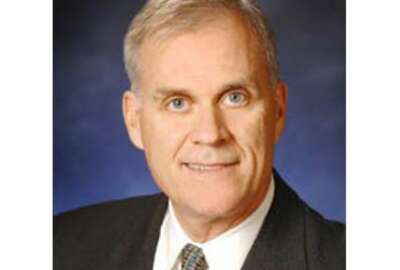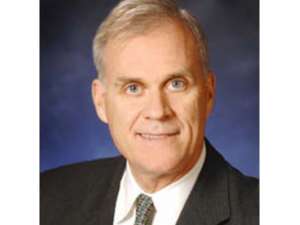
Navy secretary nominee Spencer and his cheese move on through confirmation hearing
Richard Spencer and his favorite business theory sailed through a July 11 Senate Armed Services Committee confirmation hearing.
It seems like it will be smooth sailing for Navy Secretary nominee Richard Spencer, at least in getting through his first hurdle of passing through the Senate Armed Services Committee.
Spencer wasn’t President Donald Trump’s first choice as Navy secretary, but he’s likely the one that will stick. Trump’s first pick dropped out of the running in February.
Ushered in by former Sen. John Warner (R-Va.) as a character witness, Spencer passed through Chairman John McCain’s (R-Ariz.) gauntlet with flying colors. Spencer also brought back a phrase from the lexicon of the 1990s: “moving cheese.”
The term, as Spencer described it to reporters after his July 11 nomination hearing, is about “moving people’s jobs around and changing things on a structural basis and how you deal with that and engage all those that are involved. It doesn’t mean you cut people’s heads off and send them out the door. It means, ‘You did a great job here at X, we are not putting you over here at Y and by the way, you doing Y we have to either retool you or find an area where you are excited to work because you weren’t excited to work over here and by the way if this isn’t for you that’s fine we’ll find another place for you or you can get off the bus.’”

The phrase comes from a 1998 business management book called “Who Moved My Cheese?” and it seems to be a theory Spencer embodies.
“There’s a lot of heavy lifting that has to be done. There’s a lot of cheese-moving that has to be done. We have to streamline processes, we have to address capabilities, and I believe that is number one on the issue,” Spencer told McCain of his priorities if confirmed.
The general philosophy accepts change, anticipates it, monitors it, adapts to it, changes with it and prepares for more change.
To that point, Spencer seemed to be prepared to change areas of the Navy to adapt to 21st century issues.
Spencer floated the idea of changing the “up or out system” for weapons system program managers as a means of increasing accountability.
“If, in fact, we have a large-platform weapons program, one of the things that I might propose is that we have the program executive and the program manager stay in place for the first generation of production,” Spencer said. “[We’d] have your job depend upon it. But also, that kind of flies in the face of ‘up and out.’ So we’re going to have to adjust some situations here on how we promote people and if we’re going to expect this out of them.”
Spencer said the Strategic Systems Program, a specialized military workforce, already employs a promotion system for acquisition where program managers are held responsible longer for a system.
“You walk in the door, you stay there your whole life, you can make it flag there. I don’t think we need to make it that extreme but there is an example of this thing we can follow,” Spencer said.
Spencer seemed open to rethinking the entire “up or out” policy in general.
He told reporters that he was open to anything that could make the Navy better.
Spencer’s advance policy questions to the committee seemed to embrace efforts for change as well.
Spencer supports another round of base realignment and closures, something the Defense Department has been asking for over the past years. Spencer noted the Navy needed to be careful about letting go of waterfront property, because it is costly to buy it back.
Speaking of waterfronts, Spencer also said the Navy would continue to prepare for climate change by preparing bases and installations and for crises and insecurity caused by global warming.
Spencer is an advocate of increasing sailors’ change of station lead time to five or six months.
“I believe that a lead time of two months is inadequate to permit sailors, marines and families to properly plan for what are oftentimes very complicated and stressful moves,” Spencer’s written answers to the committee stated.
Changes in personnel issues are important as the military continues to struggle to hold on to the talented individuals it wants.
“My priorities being people, capacity and process, people are number one. And we are going to have to take every single best practice we can find from within the government, from the private sector, to address the situation you just mentioned,” Spencer told Sen. Lindsey Graham (R-S.C.), when asked about retaining talent. “Whether it be a SEAL, whether it be our cyber experts, we’re going to have to find a flexible way to allow people in the cyber field to leave and come back, because I believe they have to be refreshed in their own community. And I look forward to working with you all to think outside the box on how we can do this.”
Copyright © 2025 Federal News Network. All rights reserved. This website is not intended for users located within the European Economic Area.
Scott Maucione is a defense reporter for Federal News Network and reports on human capital, workforce and the Defense Department at-large.
Follow @smaucioneWFED



